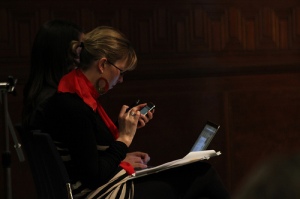Myself and my colleague Stef divided MoodleMoot between us this year and I attended the second day of the conference on 20th April.
This was my first MoodleMoot and while there was a lot to enjoy I found the second day quite short and with two keynotes there was not much time to hear about other participants’ experiences of using Moodle.
Keynote
The day started with a Skype keynote from Martin Dougiamas, who is the man who started Moodle. Martin outlined changes in store for Moodle 2.1 which is due for release at the end of June this year and there was lots of excitement on Twitter around the Moodle mobile app (only available for iphones initially). Before you get too excited…, please note that we do not have a date for installation of this version of Moodle at City University London.
Knowledge Café
We moved onto a Knowledge Café where we formed discussion groups to brainstorm our ideas for the future of MoodleMoot and how to engage staff in developing blended learning modules using Moodle. There were agreement around the table that it is was worthwhile to personalise guidance and videos to your own institution’s VLE.
Workshops
I enjoyed the 5 Years of Moodle at the University of Sussex session. University of Sussex have developed a new page format in Moodle that reduces the ‘scroll of death’ on Moodle by structuring the content into chapters and sub-chapters. There were some whispers that it looked rather like WebCT’s learning module!
Tim Hunt, a Moodle Developer at Open University presented the new quiz engine for Moodle 2.1. The new quiz engine introduces some new question types, interactive adaptive feedback and Certainty Based Marking. “Certainty Based Marking (CBM) involves asking students not only the answer to an objective question, but also how certain they are that their answer is correct.” (Gardner-Medwin and Curtin (2007, p1). With the new question engine students will be able to answer a multiple choice question and then indicate how confident they are in the answer that they have provided. I think that this will have application in health programmes that we provide.
Closing Keynote
Dr Tim Anstiss rounded off the day by asking us to ponder “what is happiness?” Nothing to do with Moodle, as it happens, but an uplifting way to finish off the day.
References:
Gardner-Medwin , T. & Curtin, N. (2007) Certainty-Based Marking (CBM) for Reflective Learning and Proper Knowledge Assessment. [online] Available from: http://www.ucl.ac.uk/lapt/REAP_cbm.pdf (Accessed: 5.5.11)




Leave a Reply